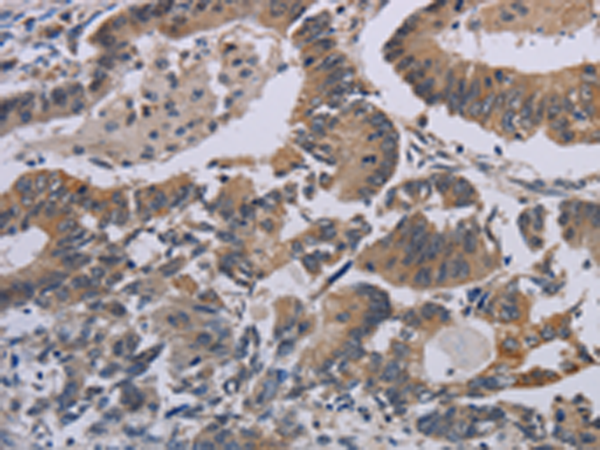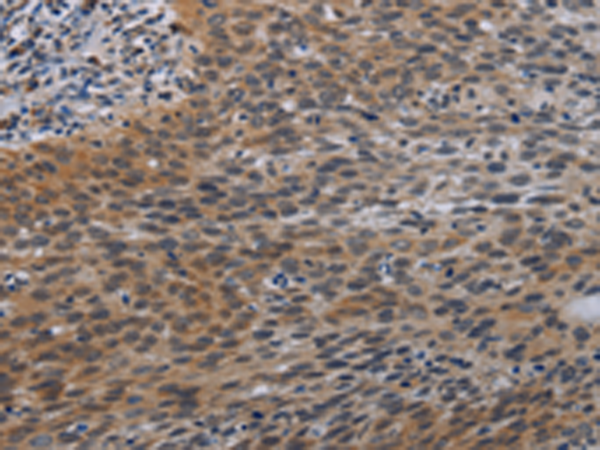

| WB | 1/500-1/1000 | Human,Mouse,Rat |
| IF | 咨询技术 | Human,Mouse,Rat |
| IHC | 咨询技术 | Human,Mouse,Rat |
| ICC | 技术咨询 | Human,Mouse,Rat |
| FCM | 咨询技术 | Human,Mouse,Rat |
| Elisa | 咨询技术 | Human,Mouse,Rat |
| Aliases | P500; SISe; TCA3; I-309; SCYA1 |
| Host/Isotype | Rabbit IgG |
| Antibody Type | Primary antibody |
| Storage | Store at 4°C short term. Aliquot and store at -20°C long term. Avoid freeze/thaw cycles. |
| Species Reactivity | Human |
| Immunogen | Synthetic peptide of human CCL1 |
| Formulation | Purified antibody in PBS with 0.05% sodium azide and 50% glycerol. |
+ +
以下是关于FEN1抗体的3篇参考文献的简要整理:
---
1. **"Structure and function of the human Flap endonuclease 1 (FEN1) in DNA repair"**
- **作者**: Liu Y, et al.
- **摘要**: 该研究解析了FEN1蛋白的结构,并利用特异性抗体通过免疫印迹和免疫荧光技术验证了其在DNA损伤修复中的作用,发现FEN1通过切割DNA flap结构参与碱基切除修复和长片段修复途径。
2. **"FEN1 ensures telomere stability by facilitating replication fork re-initiation"**
- **作者**: Shen B, et al.
- **摘要**: 文章通过FEN1抗体进行染色质免疫沉淀(ChIP)和共聚焦显微镜分析,证明FEN1在维持端粒复制稳定性中的关键作用,其缺失会导致复制叉停滞和端粒异常缩短。
3. **"Antibody-based profiling of FEN1 expression in colorectal cancer tissues"**
- **作者**: Sakurai S, et al.
- **摘要**: 研究使用FEN1单克隆抗体对结直肠癌组织进行免疫组化分析,发现FEN1在肿瘤细胞中高表达,且与患者预后不良相关,提示其作为潜在生物标志物的价值。
---
以上文献涵盖了FEN1的结构功能研究、在端粒稳定性中的作用,以及临床肿瘤学中的应用,均通过抗体技术(如Western blot、免疫荧光、ChIP等)支持实验结论。如需更多文献或具体细节,可进一步补充说明。
The Flap Endonuclease 1 (FEN1) antibody is a crucial tool for studying the role of FEN1. a multifunctional enzyme involved in DNA replication and repair. FEN1 plays a key role in processing Okazaki fragments during lagging-strand DNA synthesis and resolving DNA flap structures during long-patch base excision repair (BER). It also participates in maintaining genomic stability by preventing repeat sequence expansions and mitigating replication stress. Antibodies targeting FEN1 are widely used in molecular biology research to detect FEN1 expression, localization, and interactions in various experimental models, including Western blotting, immunohistochemistry, immunofluorescence, and co-immunoprecipitation assays.
FEN1 dysregulation has been linked to cancer, neurodegenerative disorders, and aging-related pathologies, making its antibody valuable for investigating disease mechanisms. Researchers utilize these antibodies to study FEN1's cell cycle-dependent expression, its collaboration with other DNA repair proteins (e.g., PCNA, DNA ligase I), and its potential as a therapeutic target. Commercial FEN1 antibodies are typically raised against specific epitopes of human or murine FEN1. with validation in knockout cell lines to confirm specificity. Their applications span basic DNA repair studies, cancer biomarker research, and drug development targeting DNA replication pathways.
×